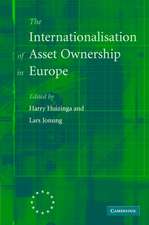Experiments in Financial Democracy: Corporate Governance and Financial Development in Brazil, 1882–1950: Studies in Macroeconomic History
Autor Aldo Musacchioen Limba Engleză Paperback – 25 mar 2015
| Toate formatele și edițiile | Preț | Express |
|---|---|---|
| Paperback (1) | 289.01 lei 6-8 săpt. | |
| Cambridge University Press – 25 mar 2015 | 289.01 lei 6-8 săpt. | |
| Hardback (1) | 567.49 lei 6-8 săpt. | |
| Cambridge University Press – 13 sep 2009 | 567.49 lei 6-8 săpt. |
Din seria Studies in Macroeconomic History
-
![Teach Your Kids about Countries [Vol 5]: Version Adaptada Al Castellano Actual Por Rafael Antunez y Raul Alonso](https://i4.books-express.ro/bs/9781480268197/teach-your-kids-about-countries-vol-5.jpg) Preț: 61.51 lei
Preț: 61.51 lei -
 Preț: 167.96 lei
Preț: 167.96 lei -
 Preț: 95.31 lei
Preț: 95.31 lei -
 Preț: 74.52 lei
Preț: 74.52 lei -
 Preț: 53.96 lei
Preț: 53.96 lei -
![Teach Your Kids about Countries [Vol13]: Version Adaptada Al Castellano Actual Por Rafael Antunez y Raul Alonso](https://i2.books-express.ro/bs/9781480268272/teach-your-kids-about-countries-vol13.jpg) Preț: 61.51 lei
Preț: 61.51 lei -
 Preț: 125.81 lei
Preț: 125.81 lei -
 Preț: 64.79 lei
Preț: 64.79 lei -
 Preț: 131.58 lei
Preț: 131.58 lei -
 Preț: 86.92 lei
Preț: 86.92 lei -
 Preț: 56.92 lei
Preț: 56.92 lei - 9%
 Preț: 592.73 lei
Preț: 592.73 lei -
 Preț: 63.20 lei
Preț: 63.20 lei -
![Teach Your Kids about Countries [Vol 17]: Version Adaptada Al Castellano Actual Por Rafael Antunez y Raul Alonso](https://i2.books-express.ro/bs/9781480268326/teach-your-kids-about-countries-vol-17.jpg) Preț: 61.51 lei
Preț: 61.51 lei -
 Preț: 40.48 lei
Preț: 40.48 lei -
 Preț: 59.67 lei
Preț: 59.67 lei -
 Preț: 54.03 lei
Preț: 54.03 lei -
 Preț: 92.61 lei
Preț: 92.61 lei -
![Teach Your Kids about Countries [Vol4 ]: Version Adaptada Al Castellano Actual Por Rafael Antunez y Raul Alonso](https://i3.books-express.ro/bs/9781480268180/teach-your-kids-about-countries-vol4.jpg) Preț: 61.51 lei
Preț: 61.51 lei -
 Preț: 135.03 lei
Preț: 135.03 lei -
 Preț: 75.99 lei
Preț: 75.99 lei -
 Preț: 104.33 lei
Preț: 104.33 lei -
 Preț: 130.65 lei
Preț: 130.65 lei -
 Preț: 201.11 lei
Preț: 201.11 lei -
 Preț: 83.38 lei
Preț: 83.38 lei -
 Preț: 62.62 lei
Preț: 62.62 lei -
 Preț: 177.10 lei
Preț: 177.10 lei -
 Preț: 123.49 lei
Preț: 123.49 lei -
 Preț: 95.96 lei
Preț: 95.96 lei -
 Preț: 208.23 lei
Preț: 208.23 lei -
![Teach Your Kids about Countries [Vol 22]: Version Adaptada Al Castellano Actual Por Rafael Antunez y Raul Alonso](https://i2.books-express.ro/bs/9781480268371/teach-your-kids-about-countries-vol-22.jpg) Preț: 61.51 lei
Preț: 61.51 lei -
![Teach Your Kids about Countries [Vol 25]: Version Adaptada Al Castellano Actual Por Rafael Antunez y Raul Alonso](https://i0.books-express.ro/bs/9781480268401/teach-your-kids-about-countries-vol-25.jpg) Preț: 61.51 lei
Preț: 61.51 lei -
![Teach Your Kids about Countries [Vol8]: Version Adaptada Al Castellano Actual Por Rafael Antunez y Raul Alonso](https://i2.books-express.ro/bs/9781480268227/teach-your-kids-about-countries-vol8.jpg) Preț: 61.70 lei
Preț: 61.70 lei -
 Preț: 51.11 lei
Preț: 51.11 lei -
 Preț: 96.04 lei
Preț: 96.04 lei -
 Preț: 96.45 lei
Preț: 96.45 lei -
 Preț: 46.84 lei
Preț: 46.84 lei -
![Teach Your Kids about Countries [Vol2]: Version Adaptada Al Castellano Actual Por Rafael Antunez y Raul Alonso](https://i1.books-express.ro/bs/9781480268166/teach-your-kids-about-countries-vol2.jpg) Preț: 61.51 lei
Preț: 61.51 lei -
 Preț: 55.99 lei
Preț: 55.99 lei -
 Preț: 69.21 lei
Preț: 69.21 lei -
 Preț: 72.83 lei
Preț: 72.83 lei -
 Preț: 93.90 lei
Preț: 93.90 lei -
 Preț: 88.56 lei
Preț: 88.56 lei -
 Preț: 51.36 lei
Preț: 51.36 lei -
 Preț: 80.19 lei
Preț: 80.19 lei -
 Preț: 78.74 lei
Preț: 78.74 lei - 20%
 Preț: 45.72 lei
Preț: 45.72 lei -
 Preț: 212.46 lei
Preț: 212.46 lei -
 Preț: 71.19 lei
Preț: 71.19 lei
Preț: 289.01 lei
Nou
Puncte Express: 434
Preț estimativ în valută:
55.31€ • 57.53$ • 45.66£
55.31€ • 57.53$ • 45.66£
Carte tipărită la comandă
Livrare economică 14-28 aprilie
Preluare comenzi: 021 569.72.76
Specificații
ISBN-13: 9781107514782
ISBN-10: 1107514789
Pagini: 326
Ilustrații: 17 b/w illus. 45 tables
Dimensiuni: 153 x 230 x 18 mm
Greutate: 0.48 kg
Editura: Cambridge University Press
Colecția Cambridge University Press
Seria Studies in Macroeconomic History
Locul publicării:New York, United States
ISBN-10: 1107514789
Pagini: 326
Ilustrații: 17 b/w illus. 45 tables
Dimensiuni: 153 x 230 x 18 mm
Greutate: 0.48 kg
Editura: Cambridge University Press
Colecția Cambridge University Press
Seria Studies in Macroeconomic History
Locul publicării:New York, United States
Cuprins
1. Introduction; 2. Financial development in Brazil in the nineteenth century; 3. The stock exchange and the early industrialization of Brazil, 1882–1930; 4. The foundations of financial democracy: disclosure laws and shareholder protections in corporate bylaws; 5. Voting rights, government guarantees, and ownership concentration, 1890–1950; 6. Directors, corporate governance, and executive compensation in Brazil, c.1909; 7. Bond markets and creditor rights in Brazil, 1850–1945; 8. Were bankers acting as market makers?; 9. What went wrong after World War I?; 10. The rise of concentrated ownership in the twentieth century; 11. Conclusion.
Recenzii
'Aldo Musacchio has drawn upon a sophisticated analysis of numerous archival sources and many firm records to provide an interesting history of Brazilian banking over the course of seven decades. This study is used to deal with important issues relating to legal and institutional factors influencing management structure and performance. Given our current discussions of the role of institutions on the desired form of bank behavior, this study has a much broader significance for understanding economic considerations in other parts of the world.' Stanley L. Engerman, University of Rochester
'Many scholars have theorized about the links between law and economics. In this marvellous book, Aldo Musacchio uses meticulous historical research to reveal how these links actually operated in practice. He shows how, in Brazil a century ago, corporate governance was ahead of national law when it came to offering protection to investors in both bonds and stocks. This monograph is a major contribution not just to the field of Brazilian history but to the much larger social science literature on institutions and economic growth.' Niall Ferguson, Harvard University and author of The House of Rothschild, The Cash Nexus, and The Ascent of Money
'This thought-provoking book convincingly demonstrates the value of historical case studies for our understanding of the processes of economic development. More than any work I know it shows how misleading inferences from cross-country growth regressions can be. Musacchio challenges in one fell swoop both the law-and-finance and the colonial-origins theories of economic development by showing that Brazil's economic problems have their roots in its response to the world wars and macroeconomic shocks of the twentieth century.' Naomi Lamoreaux, University of California, Los Angeles
'Aldo Musacchio has written an insightful study of Brazilian financial history. Disconcerting perhaps to a law professor, and to others who see legal institutions as primary and determinative, Musacchio shows that the ups and downs of finance in Brazil over nearly a century do not tie in nicely to legal change. Rather, he argues, they tie more closely to broad-based change in the economic demands on business enterprise, such as changes in cross-border capital flows or inflationary shocks. Moreover, within a single nation's legal system, the legal modes – from legislation to contract to regulation – change over time. Musacchio's book, although focused on Brazilian financial history, is not just for Brazilianists.' Mark J. Roe, Harvard Law School
'If you thought that the dismal state of corporate governance in Latin America is a direct product of its colonial or civil law heritage, Experiments in Financial Democracy will make you think again. Based on painstaking archival work, Aldo Musacchio demonstrates that in the late nineteenth century, investors in Brazilian corporations were better protected than they were in the late twentieth century. The law secured the claims of bondholders while many firms protected minority shareholders in their corporate charters. The work convincingly demonstrates that even poor countries can create and implement institutions favorable to capital markets. This optimistic historical finding is fully relevant to our troubled financial times.' Jean-Laurent Rosenthal, California Institute of Technology
'Many scholars have theorized about the links between law and economics. In this marvellous book, Aldo Musacchio uses meticulous historical research to reveal how these links actually operated in practice. He shows how, in Brazil a century ago, corporate governance was ahead of national law when it came to offering protection to investors in both bonds and stocks. This monograph is a major contribution not just to the field of Brazilian history but to the much larger social science literature on institutions and economic growth.' Niall Ferguson, Harvard University and author of The House of Rothschild, The Cash Nexus, and The Ascent of Money
'This thought-provoking book convincingly demonstrates the value of historical case studies for our understanding of the processes of economic development. More than any work I know it shows how misleading inferences from cross-country growth regressions can be. Musacchio challenges in one fell swoop both the law-and-finance and the colonial-origins theories of economic development by showing that Brazil's economic problems have their roots in its response to the world wars and macroeconomic shocks of the twentieth century.' Naomi Lamoreaux, University of California, Los Angeles
'Aldo Musacchio has written an insightful study of Brazilian financial history. Disconcerting perhaps to a law professor, and to others who see legal institutions as primary and determinative, Musacchio shows that the ups and downs of finance in Brazil over nearly a century do not tie in nicely to legal change. Rather, he argues, they tie more closely to broad-based change in the economic demands on business enterprise, such as changes in cross-border capital flows or inflationary shocks. Moreover, within a single nation's legal system, the legal modes – from legislation to contract to regulation – change over time. Musacchio's book, although focused on Brazilian financial history, is not just for Brazilianists.' Mark J. Roe, Harvard Law School
'If you thought that the dismal state of corporate governance in Latin America is a direct product of its colonial or civil law heritage, Experiments in Financial Democracy will make you think again. Based on painstaking archival work, Aldo Musacchio demonstrates that in the late nineteenth century, investors in Brazilian corporations were better protected than they were in the late twentieth century. The law secured the claims of bondholders while many firms protected minority shareholders in their corporate charters. The work convincingly demonstrates that even poor countries can create and implement institutions favorable to capital markets. This optimistic historical finding is fully relevant to our troubled financial times.' Jean-Laurent Rosenthal, California Institute of Technology
Notă biografică
Descriere
A detailed historical description of the evolution of corporate governance and stock markets in Brazil in the late nineteenth and twentieth centuries.














